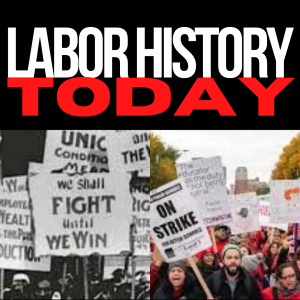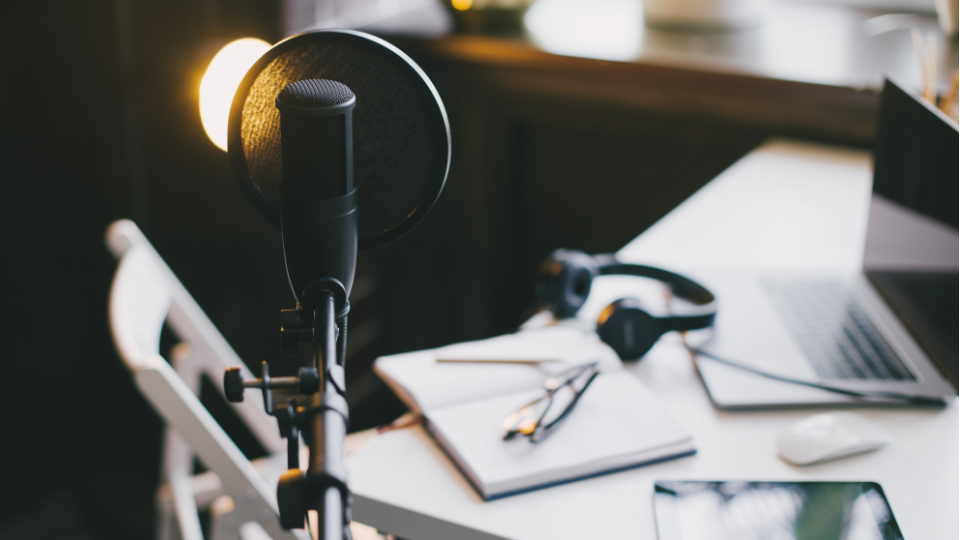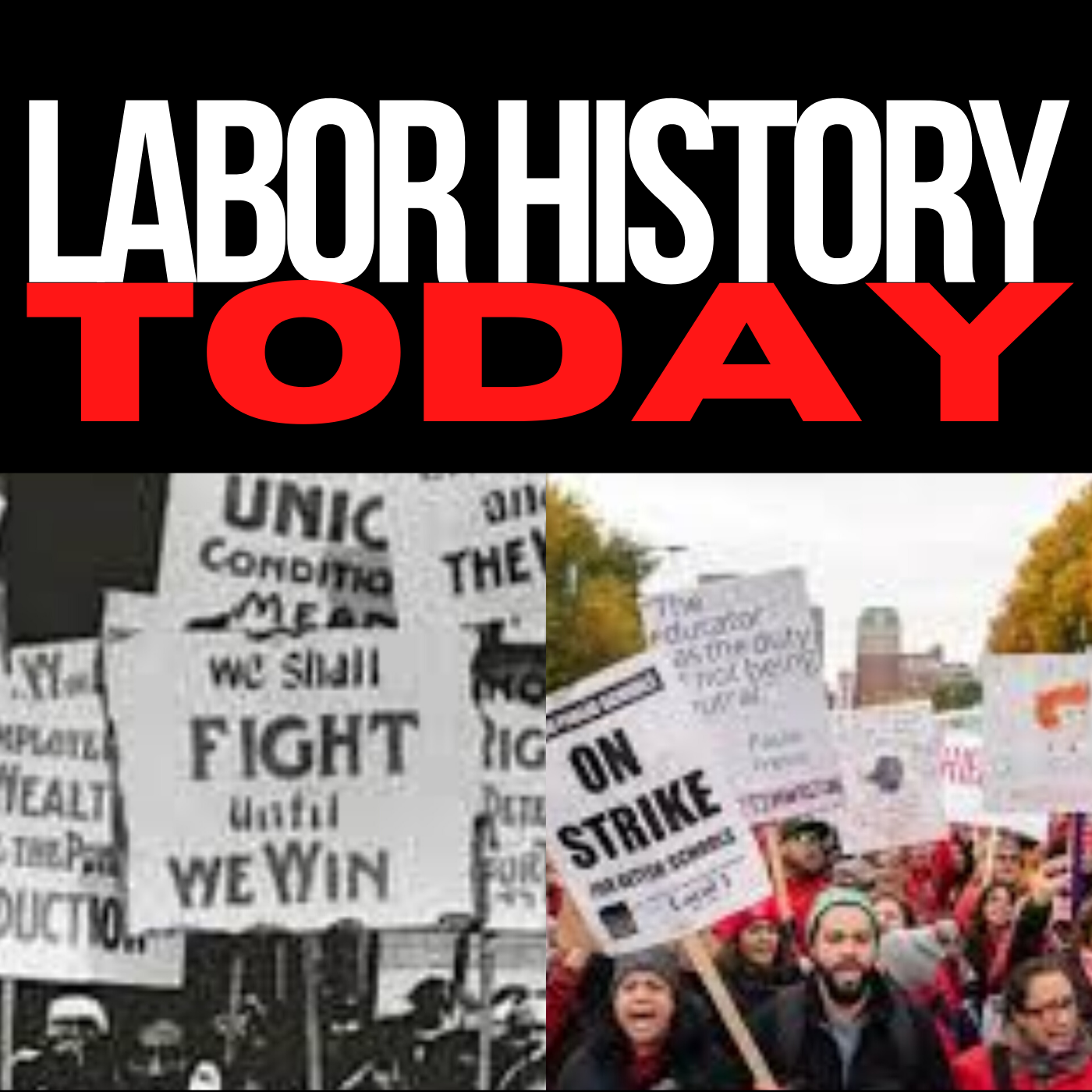Episodes
Episodes



Sunday Oct 03, 2021
Sharecroppers’ struggles for rights and power
Sunday Oct 03, 2021
Sunday Oct 03, 2021
(Originally released 10/7/2018) Patrick Dixon talks with James Benton about the emergence of sharecropping as a compromise between former slaves – freedmen – and landowners, and sharecroppers subsequent struggles for rights and power. For our Labor History Object of the week, Ben Blake at the Meany Labor Archives pulls out a collection of buttons from the Solidarnosc union movement in Poland.
Questions, comments or suggestions welcome, and to find out how you can be a part of Labor History Today, email us at LaborHistoryToday@gmail.com
Labor History Today is produced by Union City Radio and the Kalmanovitz Initiative for Labor and the Working Poor. Engineered by Chris Garlock.
This week's music: Sharecropper's Blues, featuring Charlie Barnet with Kay Starr on vocals.
#LaborRadioPod #History #WorkingClass #ClassStruggle @GeorgetownKILWP #LaborHistory @UMDMLA #unions #sharecroppers #jamesBenton #solidarnosc #poland



Sunday Sep 26, 2021
Feathers and Pennies - the 1888 Matchgirls and us
Sunday Sep 26, 2021
Sunday Sep 26, 2021
In May of 1888, women and teenage girls working at the Bryant & May match factory in London went out on strike. Few Americans will have heard of the Matchgirls’ strike, but it was a landmark victory in working-class history. On today’s show, Union Dues podcast host Simon Sapper explores the legacy of the Matchgirls' strike on union organizing, safe working conditions, a collective voice and women's emancipation and Simon finds a "golden thread" linking then to now.
And, on Labor History in 2:00, the year was 1786. Daniel Shays led a group of farmers and an armed uprising. They were angry about taxes levied by the state of Massachusetts.Audio on today’s show includes the trailer for The Matchgirls, book and lyrics by Bill Owen, music by Tony Russell, performed at the Bernie Grant Arts Centre, in London in July 2012.Produced by Chris Garlock. To contribute a labor history item, email laborhistorytoday@gmail.com
Labor History Today is produced by the Metro Washington Council’s Union City Radio and the Kalmanovitz Initiative for Labor and the Working Poor at Georgetown University.
#LaborRadioPod #History #WorkingClass #ClassStruggle @GeorgetownKILWP #LaborHistory @UMDMLA @ILLaborHistory @AFLCIO @duesunion



Sunday Sep 19, 2021
Trumka: “Art is why they remember our struggles”
Sunday Sep 19, 2021
Sunday Sep 19, 2021
Former AFL-CIO president Richard Trumka on the critical role labor arts play in “supporting our fights for economic and social justice.” He spoke at the 31st annual Great Labor Arts Exchange in 2013, organized by the Labor Heritage Foundation.
And, on Labor History in 2:00, the year was 1981; more than 400,000 union members marched in Labor Day's first Solidarity Day demonstration in Washington, D.C.Plus: an excerpt from "Solidarity Day, 1981”, an 11-minute film produced by the AFL-CIO. Music for today’s show by The ULiNERS and Joe Uehlein.Special thanks to Ellis Boal and Saul Schniderman for the recording of Trumka; subscribe to Saul’s Friday’s Labor Folklore newsletter here. Produced by Chris Garlock. To contribute a labor history item, email laborhistorytoday@gmail.com
Labor History Today is produced by the Metro Washington Council’s Union City Radio and the Kalmanovitz Initiative for Labor and the Working Poor at Georgetown University.
#LaborRadioPod #History #WorkingClass #ClassStruggle @GeorgetownKILWP #LaborHistory @UMDMLA @ILLaborHistory @AFLCIO @LaborHeritage1 @THEULINERS
This post has been updated: the 31st GLAE took place in 2013, not 2017.



Monday Sep 13, 2021
Live from The Battle of Blair Mountain!
Monday Sep 13, 2021
Monday Sep 13, 2021
On today’s show, Labor Day weekend marked the 100 year anniversary of the Battle of Blair Mountain. Empathy Media Lab’s Evan Papp traveled to West Virginia to march in those historic footsteps, to bear witness to battles that some would like us to forget, and he brings us the sounds of history past and present.
From the On The Line: Stories of BC Workers podcast, we bring you their story from September 1938, when the International Ladies Garment Workers Union brought their theatrical musical hit “Pins and Needles” to Vancouver, British Columbia, where it played to glowing reviews.
And, on Labor History in 2:00, the year was 1934. That was the day Rhode Island governor Theodore Green demanded that federal troops be sent to crush a textile strike in his state.
Produced by Chris Garlock. To contribute a labor history item, email laborhistorytoday@gmail.com
Labor History Today is produced by the Metro Washington Council’s Union City Radio and the Kalmanovitz Initiative for Labor and the Working Poor at Georgetown University.
#LaborRadioPod #History #WorkingClass #ClassStruggle @GeorgetownKILWP #LaborHistory @UMDMLA @ILLaborHistory @AFLCIO @of_blair @MineWorkers @CecilRoberts @empathymedialab @BC_LHC



Sunday Sep 05, 2021
The Battle of Blair Mountain; Remembering Ed Asner
Sunday Sep 05, 2021
Sunday Sep 05, 2021
On today’s show, we remember actor Ed Asner, best known for his role as a tough newspaperman on the Lou Grant show during the 1970s and early 1980s. He was also an ardent unionist, serving two terms as president of the Screen Actors Guild. Ed once said “You’re either a union or you’re not; you either go on strike for issues and know what you’re striking for or you don’t.” Ed talked with Judy Ancel on the Heartland Labor Forum radio show back in 2013.
This Labor Day weekend marks the 100-year anniversary of the Battle of Blair Mountain, which was part of the West Virginia Mine Wars, in which miners and their families laid down a foundation to fight for every worker’s labor rights. From Empathy Media Lab, we bring you David Rovics’ audio essay about the battle that was the largest armed insurrection in the U.S. since the Civil War.
And, on Labor History in 2:00, the year was 1882. That was the day that the first labor day celebration and parade took place in New York City.PLUS: Bakery strikes in Cool Things from the Meany Archives.
Produced by Chris Garlock. To contribute a labor history item, email laborhistorytoday@gmail.com
Labor History Today is produced by the Metro Washington Council’s Union City Radio and the Kalmanovitz Initiative for Labor and the Working Poor at Georgetown University.
#LaborRadioPod #History #WorkingClass #ClassStruggle @GeorgetownKILWP #LaborHistory @UMDMLA @ILLaborHistory @AFLCIO @TheOnlyEdAsner @of_blair @MineWorkers @empathymedialab



Sunday Aug 29, 2021
Marching on Washington: civil rights to voting rights
Sunday Aug 29, 2021
Sunday Aug 29, 2021
Thousands took to the streets of Washington DC yesterday to commemorate the 58th anniversary of the historic March on Washington for Jobs and Freedom. This year the focus was voting rights, with a new generation of activists denouncing voter suppression and demanding fair access to the vote for all, insisting that the vision Martin Luther King expressed in his “I Have a Dream” speech in 1963 be deferred no longer.
On today’s show, our 2019 interview with professor William P. Jones, vice president of the Labor and Working Class History Association, and author of “The March on Washington: Jobs, Freedom, and the Forgotten History of Civil Rights.”
And, on Labor History in 2:00, Defense Industry Workers Strike on Eve of World War Two.
Produced by Chris Garlock. To contribute a labor history item, email laborhistorytoday@gmail.com
Labor History Today is produced by the Metro Washington Council’s Union City Radio and the Kalmanovitz Initiative for Labor and the Working Poor at Georgetown University.
#LaborRadioPod #History #WorkingClass #ClassStruggle @GeorgetownKILWP #LaborHistory @UMDMLA @ILLaborHistory @AFLCIO #VotingRightsMarch #WeMarchOn



Sunday Aug 22, 2021
Sacco and Vanzetti; Midnight in Vehicle City
Sunday Aug 22, 2021
Sunday Aug 22, 2021
Italian immigrants Nicola Sacco and Bartolomeo Vanzetti, two anarchists accused of murder and tried unfairly, were executed on August 23, 1927 in Boston, Massachusetts. The case became an international cause and sparked demonstrations and strikes throughout the world; on today’s show (originally posted April 29, 2018), Patrick Dixon talks with historian Kevin Boyle, who’s studied the case extensively. Also this week, journalist and historian Edward McClelland recounts the gripping details of the historic Flint sit-down strike. He spoke with the Tales from the Reuther Library podcast about what we can learn today from the strikers’ successful fight in 1936 and 1937 for shared prosperity. McClelland is author of Midnight in Vehicle City: General Motors, Flint, and the Strike That Built the Middle Class.And, on Labor History in 2:00, Breaking the Glass Ceiling, the story of Joyce Miller.
Produced by Chris Garlock. To contribute a labor history item, email laborhistorytoday@gmail.com
Labor History Today is produced by the Metro Washington Council’s Union City Radio and the Kalmanovitz Initiative for Labor and the Working Poor at Georgetown University.
#LaborRadioPod #History #WorkingClass #ClassStruggle @GeorgetownKILWP #LaborHistory @UMDMLA @ILLaborHistory @AFLCIO @ReutherLibrary



Sunday Aug 15, 2021
Trumka on the future of American labor (archive show)
Sunday Aug 15, 2021
Sunday Aug 15, 2021
AFL-CIO president Rich Trumka, who died August 5, returned to federation headquarters yesterday for the last time, giving the public the opportunity to pay its respects to the labor legend. Labor History Today pays our respects today with Part 2 of our 2019 interview with Trumka, in which he talks with labor historian Joe McCartin about the current state – and the future -- of the American labor movement.Plus, Mark Potashnick on Jim Pohle, the founder of the American Union of Pizza Delivery Drivers, class action law suits, and the app-based revolution in food delivery services.
Produced by Chris Garlock. To contribute a labor history item, email laborhistorytoday@gmail.com
Labor History Today is produced by the Metro Washington Council’s Union City Radio and the Kalmanovitz Initiative for Labor and the Working Poor at Georgetown University.
#LaborRadioPod #History #WorkingClass #ClassStruggle @GeorgetownKILWP #LaborHistory @UMDMLA @ILLaborHistory @AFLCIO @RichardTrumka Pass the #PROAct




